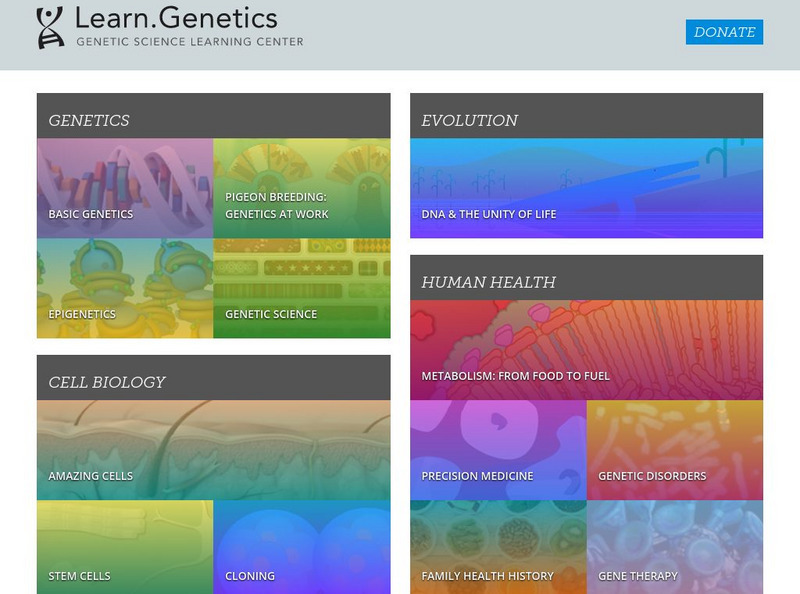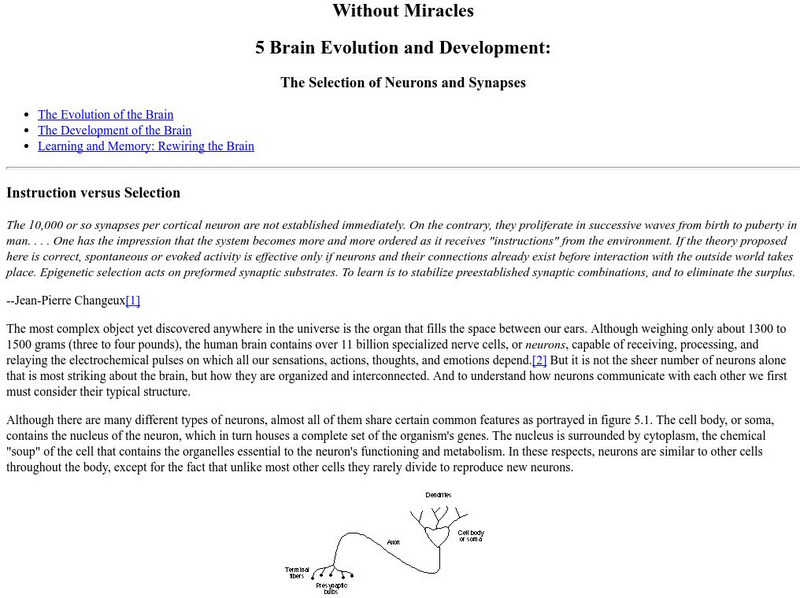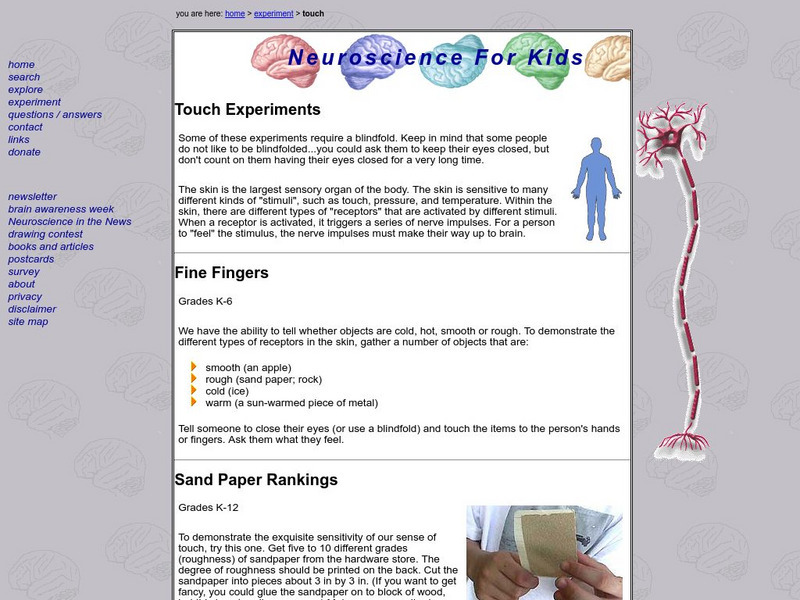Hi, what do you want to do?
TeachEngineering
Teach Engineering: How Do Sensors Work?
Through six lesson/activity sets, students learn about the functioning of sensors, both human and robotic
TeachEngineering
Teach Engineering: Brain Is a Computer
Students learn about the similarities between the human brain and its engineering counterpart, the computer. Since students work with computers routinely, this comparison strengthens their understanding of both how the brain works and...
TeachEngineering
Teach Engineering: What Is a Sensor?
Students gain a rigorous background in the primary human sensors, as preparation for comparing them to some electronic equivalents in the associated activity.
OpenStax
Open Stax: Anatomy and Physiology: The Function of Nervous Tissue
Learn here about how nervous tissue is capable of communicating within the nervous system.
Mind My Education
Mind My Education: The Life of Environments
This extensive lesson plan covers various topics about how animals interact with their environment. Topics include how animals sense their environment, how environments and organisms change together, and how animals use their senses to...
Nature Research
Nature Education: Scitable: Essentials of Cell Biology
Explains how cells send and receive signals. Includes a quiz that can be completed after free registration.
University of Utah
University of Utah: Genetic Science Learning Center: The Basics and Beyond
This website offers a clear definition of the science of Genetics, highlighting DNA and genes. There is a neat, easy-to-understand animated tour of the basics and an opportunity to go inside an animated cell. Student can build a DNA...
PBS
Pbs Learning Media: Shark Attack! The Hunt
This interactive module from the NOVA: "Shark Attack!" web site details the six senses that sharks use to find and capture their prey.
University of Illinois
University of Illinois: Brain Evolution and Development
This resource provides information about brain evolution and development.
Other
Bio Anim
BioAnin presents 3-D labeled images of all of the major systems of the human body, for example, the digestive system and the endocrine system. The images are embedded in slideshows. The site also has interactive 3-D models that can be...
National Cancer Institute at the National Institutes of Health
Seer Training Modules: Introduction to the Nervous System
Self-guided learning activity where students learn about the structure and function of the human nervous system. There is a short quiz at the end of the lesson to check for understanding.
Other
Nhs: Sense Able Ideas: Activities to Improve Oral Motor Skills
This booklet is to give you ideas and activities to help support your child / young person to improve the awareness and co-ordination of their oral motor skills.
Other
Kid Sense: Strength and Endurance
Strength and endurance are important to enable children to perform every day functions such as fine motor skills, gross motor skills, playground skills, and sporting skills. This article explains how to tell if your child has problems...
Library of Congress
Loc: Poetry 180: 96 Vandam
In this non-prose piece, the author shares sensory-filled images about a street in New York City where many homeless reside.
Library of Congress
Loc: Poetry 180: One Morning
This two-stanza poem uses strong sensory imagery to describe upsetting discoveries one morning.
University of Washington
University of Washington: The Senses Touch
Do you know what the largest sensory organ of the body is? Use this site on skin and its sense of touch to learn more.
The Write Place
Literacy Education Online: Logical Fallacies
This site from the St. Cloud State University provides many links in this index with general writing help. Under "Development" you'll find "Sensory Details." Under "Logical Fallicies" you'll find a link by the same name. Look under...
TED Talks
Ted: Ted Ed: Can Plants Talk to Each Other?
Can plants talk to each other? It certainly doesn't seem that way: They don't have complex sensory or nervous systems, like animals do, and they look pretty passive. But odd as it sounds, plants can communicate with each...
PBS
Nova: The Hunt
Learn more about the six senses that sharks use to hunt. Descriptions and pictures of each sensory organ are provided.
Other
Architeacher: Architecture and Aesthetics
Learn about the aesthetic elements of architecture and how architects manipulate a building's sensory, formal, technical, and expressive elements to achieve "good design."
Other
Lira Lab: Laboratory for Integrated Advanced Robotics
Site of the LIRA-Lab in University of Genoa, Italy which specializes in artificial vision and sensory-motor coordination from a computational neuroscience perspective.
Frontiers Media
Frontiers: Feeling Your Way and Knowing by Touch
You can perceive things by touching, tasting, smelling, listening and seeing. The sensory system that allows us to "feel" is called somatosensation (so-MAT-o-sen-sa-shun). Somatosensation is a broadly defined perceptual system that...
Scholastic
Scholastic: Study Jams! Science: The Human Body: The Senses: Smelling
Self-playing slideshow, with an accompanying quiz, explains the anatomy and sensorial function of the nose.
Writing Fix
Writing Fix: Exploring a More Specific Story
In this lesson, Ralph Fletcher's Marshfield Dreams is used as a mentor text. Students will write stories about an important friendship in their life. Then students will revise and attempt to make sure their writings have stayed on topic,...
Other popular searches
- Sensory Words
- Sensory Details
- Sensory Activities
- Sensory Language
- Sensory Writing
- Sensory Paragraph Writing
- Sensory Details in Writing
- Sensory Images
- Sensory Description
- Identifying Sensory Words
- Multi Sensory
- Sensory Details Poems























